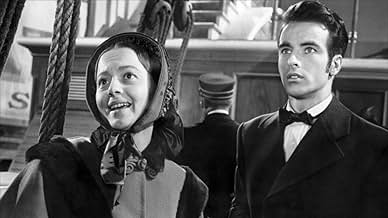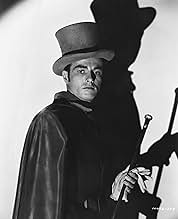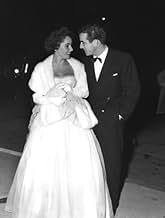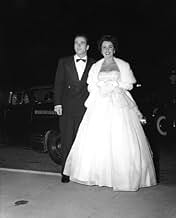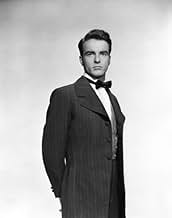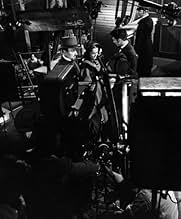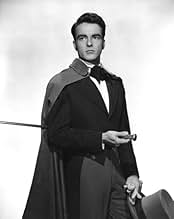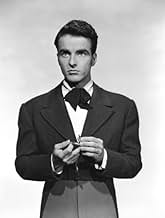IMDb RATING
8.1/10
18K
YOUR RATING
A naive young woman falls for a handsome young man her emotionally abusive father suspects is only a fortune hunter.A naive young woman falls for a handsome young man her emotionally abusive father suspects is only a fortune hunter.A naive young woman falls for a handsome young man her emotionally abusive father suspects is only a fortune hunter.
- Won 4 Oscars
- 13 wins & 9 nominations total
Mary Bayless
- Party Guest
- (uncredited)
Nan Boardman
- French Maid
- (uncredited)
Jack Chefe
- French Waiter
- (uncredited)
Marcel De la Brosse
- French Porter
- (uncredited)
Ray De Ravenne
- French Waiter
- (uncredited)
Featured reviews
Catherine (Olivia de Havilland) is a thoroughly ordinary girl with one thing commend her—her money. That's the view of her father (Ralph Richardson), who believes he is cruel only to be kind. He takes a dim view of the handsome and charming man (Montgomery Clift) who courts her. Surely this idler's only possible motive for proposing marriage is to get her money. Catherine's aunt (Miriam Hopkins) may agree, but believes the two should marry anyway. Catherine is deeply in love, but her fiancé will forever change her view of herself, of her father and of human nature as a whole.
William Wyler directs Augustus and Ruth Goetz's adaptation of their own play, suggested by Henry James's "Washington Square," and it's a fine job by all. We rarely see such a subtle and precise view of people, presented in a way that allows us to draw our own conclusions about them. Is the father villainous and cruel? Is the fiancé a fortune hunter? Do we approve or disapprove of Catherine's decisions throughout the film? We're not told what to think.
De Havilland is fine at conveying the various shades of her many-faceted character. Richardson is excellent, making the most of his mellifluous voice and superb manners. Clift is good, though his diction is lazier than that of his co-stars'. I find Clift smug and unappealing, which doesn't detract from this particular character. Miriam Hopkins, a former leading lady, aged into character parts, gives a performance rich in detail and humor. Highly recommended.
William Wyler directs Augustus and Ruth Goetz's adaptation of their own play, suggested by Henry James's "Washington Square," and it's a fine job by all. We rarely see such a subtle and precise view of people, presented in a way that allows us to draw our own conclusions about them. Is the father villainous and cruel? Is the fiancé a fortune hunter? Do we approve or disapprove of Catherine's decisions throughout the film? We're not told what to think.
De Havilland is fine at conveying the various shades of her many-faceted character. Richardson is excellent, making the most of his mellifluous voice and superb manners. Clift is good, though his diction is lazier than that of his co-stars'. I find Clift smug and unappealing, which doesn't detract from this particular character. Miriam Hopkins, a former leading lady, aged into character parts, gives a performance rich in detail and humor. Highly recommended.
Henry James novel of spinster daughter of wealthy doctor being wooed by a fortune hunter is meticulously brought to the screen by Wyler and a stellar cast. The beautiful de Havilland, made to look plain and dull, is quite good in her Oscar-winning title role. Also fine are Clift as the gold digger and Hopkins as de Havilland's understanding aunt. However, the best performance is given by Richardson as the cold, domineering father who wants to protect his daughter but also despises her meek existence. Brown, who plays the maid, looks like a young Grace Kelly. The cinematography is excellent and there's a fine score by Copland.
10Ritag2
The Heiress has to be one of the greatest movies ever made. There is nothing about it that I would change. The cast is perfect. Montgomery Clift is so wonderful as Morris Townsend. His physical beauty makes it easy to understand how someone as gauche as Catherine Sloper could overcome her shyness and respond to him. Olivia de Havilland is almost too good looking to be the unattractive Miss Sloper, however her great acting overcomes her beauty, and the viewer readily accepts her in the part. Ralph Richardson is perfect as Dr. Sloper. With his disdain for his daughter and his idealization of her dead mother, it is easy to see how his attitude has frozen his daughter in her insecurity about everything that she does. Miriam Hopkins is the perfect airhead social climber who does have affection for her niece, but becomes so wrapped up in the overall romance of the situation that she doesn't act in the best interests of her niece but in the best interests of the romantic drama that is unfolding around her. In her biography, Edith Head talks about researching and designing the clothes for this movie. Certainly the costumes greatly enhance Olivia de Havilland's ability to play this part and be accepted as the plain and graceless Catherine Sloper. A great movie that shouldn't be missed.
The Heiress (1949)
Another gem from William Wyler. This is the director of so many sparkling, flawless interpersonal dramas it's hard to believe he isn't lionized alongside more famous greats. The problem (as he admits in interviews) is he had no real style of his own. And yet, as the years go by, his "style" begins to clarify a little. Watch "The Little Foxes" or "Detective Story" or this one, "The Heiress," and you'll see an astonishing, complex handling of a small group of people with visual clarity and emotional finesse.
There is no overacting here, and no photographic flourishes to make you gasp. There are no murky shadows or gunfights or even ranting and raving. No excess. What you have here is terrific writing (thanks in part to Henry James who wrote the source story, Washington Square) and terrific acting.
The three leads are all first rate actors, surely. Montgomery Clift a young and rising star, Olivia de Havilland already famous for earlier roles (including a supporting one in "Gone with the Wind"), and the terrific stage actor Ralph Richardson, who received an Oscar nomination for his role. It is de Haviland who is the heiress of the title, and she does tend to steal the show with a performance that you would think would tip into campy excess but which just veers this side of danger and makes you feel for her scene after scene. And she took the Best Actress award for it.
A good director manages to bring the best from the actors, which Wyler clearly does. But he also finds ways to make those performances jump out of the film reality into the movie theater. His fluid, expert way of moving actors around one another, of having them trade positions or look this way or that as they deliver some intensely subtle comeback line, is really astonishing. And easy to miss, I think, if you just get absorbed in the plot. So watch it all.
The story itself is pretty chilling and oddly dramatic (dramatic for Henry James, not for Wyler, who likes a kind of soap opera drama within all his focused restraint). The heiress (de Havilland) is being pursued by a fortune hunting and rather handsome man (Clift) and she doesn't realize his love isn't for real. But the father, with his slightly cruel superiority, sees it all and tries to subtly maneuver his daughter to safety. The result is a lot of heartbreak and surprising twists of motivation.
By the end almost anything can happen, within this upper class world of manners and appropriate reactions, and de Havilland rises to the challenge. It's worth seeing how. Terrific stuff from the golden age of the silver screen, for sure.
Another gem from William Wyler. This is the director of so many sparkling, flawless interpersonal dramas it's hard to believe he isn't lionized alongside more famous greats. The problem (as he admits in interviews) is he had no real style of his own. And yet, as the years go by, his "style" begins to clarify a little. Watch "The Little Foxes" or "Detective Story" or this one, "The Heiress," and you'll see an astonishing, complex handling of a small group of people with visual clarity and emotional finesse.
There is no overacting here, and no photographic flourishes to make you gasp. There are no murky shadows or gunfights or even ranting and raving. No excess. What you have here is terrific writing (thanks in part to Henry James who wrote the source story, Washington Square) and terrific acting.
The three leads are all first rate actors, surely. Montgomery Clift a young and rising star, Olivia de Havilland already famous for earlier roles (including a supporting one in "Gone with the Wind"), and the terrific stage actor Ralph Richardson, who received an Oscar nomination for his role. It is de Haviland who is the heiress of the title, and she does tend to steal the show with a performance that you would think would tip into campy excess but which just veers this side of danger and makes you feel for her scene after scene. And she took the Best Actress award for it.
A good director manages to bring the best from the actors, which Wyler clearly does. But he also finds ways to make those performances jump out of the film reality into the movie theater. His fluid, expert way of moving actors around one another, of having them trade positions or look this way or that as they deliver some intensely subtle comeback line, is really astonishing. And easy to miss, I think, if you just get absorbed in the plot. So watch it all.
The story itself is pretty chilling and oddly dramatic (dramatic for Henry James, not for Wyler, who likes a kind of soap opera drama within all his focused restraint). The heiress (de Havilland) is being pursued by a fortune hunting and rather handsome man (Clift) and she doesn't realize his love isn't for real. But the father, with his slightly cruel superiority, sees it all and tries to subtly maneuver his daughter to safety. The result is a lot of heartbreak and surprising twists of motivation.
By the end almost anything can happen, within this upper class world of manners and appropriate reactions, and de Havilland rises to the challenge. It's worth seeing how. Terrific stuff from the golden age of the silver screen, for sure.
Rewatching The Heiress after remembering nothing but great things about it, the film was every bit as brilliant as remembered and even better in fact. It is one of William Wyler's best, in a list that includes Ben-Hur, Roman Holiday and Dodsworth, and while there are some fine film adaptations of Henry James' work, like The Innocents and The Wings of a Dove my vote for the best goes to this, The Heiress.
Visually, it looks absolutely beautiful and is rich in atmosphere. The Gothic set design is atmospheric and strikingly handsome (never getting in the way of the characters or the story), the costumes are elegantly evocative, the shadowy lighting adds so much to the atmosphere without making it obvious and The Heiress really does have to be one of the most exquisitely shot films of the late 40s, not only being very easy on the eyes but also very expansive which allows us to really be part of the action and be really engrossed in how all the characters interact with one another. Aaron Copland's haunting Oscar-winning score is some of his best work, and Wyler directs immaculately, his work worthy of winning the Oscar rather than just being nominated.
The Heiress is also superbly scripted, with sharp, sometimes cruel but always compellingly realistic, dialogue, the subject matter explored intelligently, poignantly and sometimes chillingly. The story is chillingly intense and also absorbingly intimate, always powerful and never less than interesting, while the characters actually feel like real people (Morris is the least interesting one of the bunch, but only because of how compellingly written Catherine and Dr Sloper are. Wyler is also well-known for drawing out great performances and ensemble work, and not only do we get both here across the board but they're more than great. Olivia de Havilland won her second Oscar for this film, and it was richly deserved, it is a very meaty role with a character transformation from shy to cruel that could have rung false but de Havilland plays the shyness with poignant nuance and the cruelness to spine-chilling effect, by far my favourite performance from her.
Montgomery Clift has had more interesting characters in his career, but he plays the role with control and subtlety, even also with an unsettling ambiguity as well. Ralph Richardson, like de Havilland, also delivers his finest screen work in this film, the character's coldness played to perfection. Dr Sloper and Catherine's father/daughter relationship is somewhat the core of the film and is played with brilliant passion by both Richardson and de Havilland. Miriam Hopkins is amusing and charming, but in a way that doesn't jar at all, despite how it sounds in comparison to the story.
In conclusion, a brilliant film, one of Wyler's best films and the finest screen adaptation of Henry James with career-best work from de Havilland and Richardson. 10/10 Bethany Cox
Visually, it looks absolutely beautiful and is rich in atmosphere. The Gothic set design is atmospheric and strikingly handsome (never getting in the way of the characters or the story), the costumes are elegantly evocative, the shadowy lighting adds so much to the atmosphere without making it obvious and The Heiress really does have to be one of the most exquisitely shot films of the late 40s, not only being very easy on the eyes but also very expansive which allows us to really be part of the action and be really engrossed in how all the characters interact with one another. Aaron Copland's haunting Oscar-winning score is some of his best work, and Wyler directs immaculately, his work worthy of winning the Oscar rather than just being nominated.
The Heiress is also superbly scripted, with sharp, sometimes cruel but always compellingly realistic, dialogue, the subject matter explored intelligently, poignantly and sometimes chillingly. The story is chillingly intense and also absorbingly intimate, always powerful and never less than interesting, while the characters actually feel like real people (Morris is the least interesting one of the bunch, but only because of how compellingly written Catherine and Dr Sloper are. Wyler is also well-known for drawing out great performances and ensemble work, and not only do we get both here across the board but they're more than great. Olivia de Havilland won her second Oscar for this film, and it was richly deserved, it is a very meaty role with a character transformation from shy to cruel that could have rung false but de Havilland plays the shyness with poignant nuance and the cruelness to spine-chilling effect, by far my favourite performance from her.
Montgomery Clift has had more interesting characters in his career, but he plays the role with control and subtlety, even also with an unsettling ambiguity as well. Ralph Richardson, like de Havilland, also delivers his finest screen work in this film, the character's coldness played to perfection. Dr Sloper and Catherine's father/daughter relationship is somewhat the core of the film and is played with brilliant passion by both Richardson and de Havilland. Miriam Hopkins is amusing and charming, but in a way that doesn't jar at all, despite how it sounds in comparison to the story.
In conclusion, a brilliant film, one of Wyler's best films and the finest screen adaptation of Henry James with career-best work from de Havilland and Richardson. 10/10 Bethany Cox
Did you know
- TriviaDirector William Wyler shot 37 takes of Olivia de Havilland carrying her suitcases up the stairs. Only after the final shoot, whereupon she briefly stopped on the second flight of stairs and leaned on the handrail for a couple of seconds, did Wyler declare that this was the take he wanted to print.
- GoofsThis story takes place at the end of the 1840s, but none of the men wear the cravats--material bound around the neck and tied in either the front or back--that were fashionable in that period; instead they wear neckties and bow ties, which did not come into fashion until the late 1850s.
- Quotes
Aunt Penniman: Can you be so cruel?
Catherine Sloper: Yes, I can be very cruel. I have been taught by masters.
- ConnectionsFeatured in AFI Life Achievement Award: A Tribute to William Wyler (1976)
Details
Box office
- Budget
- $2,600,000 (estimated)
- Gross worldwide
- $158
- Runtime
- 1h 55m(115 min)
- Color
- Aspect ratio
- 1.37 : 1
Contribute to this page
Suggest an edit or add missing content


